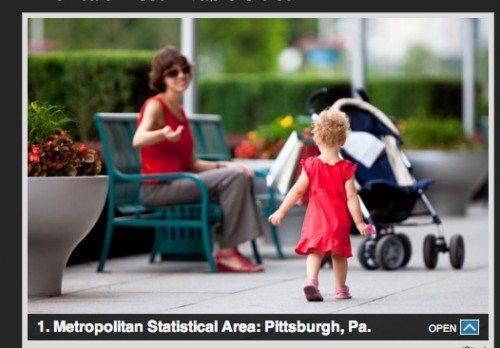A few weeks back, Forbes named Pittsburgh as the most livable city in the U.S. The description of the city talks about its “art scene, job prospects, safety and affordability,” and presents a picture of Pittsburgh as a city that has rebounded from both its industrial past and the current economic crisis to become a cultural and intellectual hotspot:
Forbes ranked cities based on unemployment, rates of income growth in the past 5 years, crime rates, cost of living, and cultural/artistic opportunities (according to Sperling’s Best Places Arts & Leisure Index). The final score is an average of the different elements, each of which are weighted equally, though I can’t help but think a lot of people might think some of those factors are more important in how they evaluate a location than others. Also, I have some reservations about rankings from Sperling’s Best Places, as they have a “manliest cities” ranking commissioned by Combos snacks that includes “sales of salty snacks/crackers” and deductions for “emasculating” criteria like sushi restaurants.
But I digress. As it turns out, this glowing report is only part of the story of Pittsburgh. The city also tops the charts in terms of African American poverty. African Americans in the region haven’t benefited from the economic turnaround Forbes discussed.
In light of this fact, Jasiri X, a rapper from Pittsburgh, wrote “America’s Most Livable City.” In the song (lyrics here) and video he questions who, exactly, the city is livable for, contrasting the image portrayed in the Forbes article with the region’s neglected and under-developed African American neighborhoods:
There are also three videos featuring Jasiri X interviewing residents of poor neighborhoods. All are worth a watch, but I think the best is the 2nd segment. A local resident discusses how what he sees as exaggerated media reports of the crime and danger in some areas — some created by well-meaning people trying to bring attention to the needs of the community by, he believes, playing up the bad aspects — served to justify abandoning Black neighborhoods in desperate need of economic opportunities:
For another discussion of very different experiences of economic crisis and recovery, see our guest post about Forbes ranking Stockton, CA, as the most miserable city in the U.S.
Thanks to Abby Kinchy for the link.









